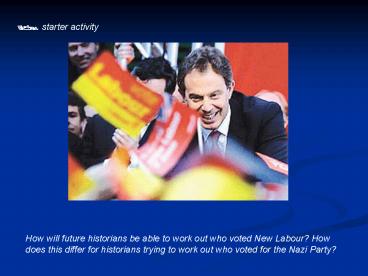starter activity PowerPoint PPT Presentation
1 / 22
Title: starter activity
1
? starter activity
How will future historians be able to work out
who voted New Labour? How does this differ for
historians trying to work out who voted for the
Nazi Party?
2
Possible answers
- Opinion polls
- Voting statistics
- Membership records
- Campaigns in the media e.g. TV, radio
newspapers - Individual interviews
3
? Your task
- Copy the list of different types of Germans on
p. 118 of Hite Hinton into your notes and
decide on the basis of what you currently know
whether they would vote Nazi (), or not (-) or
you arent sure (?)
4
NSDAP voters
- Low ranking civil servant
- Retired professor
- Army general
- Shopkeeper in northern Germany
- Female industrial worker
- Junker
- Catholic priest
- Protestant small retailer
- Industrial worker
- High-ranking civil servant
- Protestant student
- Small farmer
- Catholic unemployed worker
- Unemployed ex-soldier
- Unemployed artist
5
Who voted Nazi?
- Historiographical problems in finding out about
early support for the NSDAP
6
How can we tell who voted Nazi
- Problems- lack of opinion polls, secret ballots
- Some states held separate ballots for men women
(blue pink voting slips) - Nazis did well in certain areas, e.g.
overwhelmingly Protestant, or farming areas - Membership records SA Nazi Party
- Propaganda who they appealed to
- Autobiographies, e.g. Prof Abel, Columbia Uni,
581 autobiogs.
What are some of the problems with these sources
of evidence?
7
Why have historians views changed?
- Decline of Marxist theory of history class
struggle, oppression of working classes by middle
elite classes - More sophisticated analysis of voting behaviour
e.g. greater importance attached to religion
culture - More sophisticated data analysis use of
computerised analysis, local studies - Collapse of Communism opening of state archives
The fall of the Berlin Wall heralded the end of
Communism and the opening of many state archives
on Nazi Germany
8
? Your task
- Look at source 7.10 (p.119, Hite Hinton).
- List 2 groups that were over-represented 2
groups that were under-represented - How did membership of the party change between
1929 and 1933? - What does source 7.11 tell us about the nature of
Nazi support?
9
- Over represented white-collar workers
self-employed artisans - Under-represented Peasants, workers
10
- Membership of workers increased from 26 to 32.5,
possibly due to rising unemployment economic
crisis - Membership of white-collar workers decreased,
possibly due to fear at the growth in popularity
of radical movement like NSDAP
11
- 7.11 suggests many workers were attracted to
NSDAP by promise of greater social welfare
(clothing, accommodation board) a feeling
that the SDP had abandoned its socialist cause.
12
? Your task
- Look through the different tables on p.120-1 and
note where NSDAP support was strongest in the
following categories - Religion
- Age
- Gender
- Region
- Chronology (i.e. how did historical events impact
on Nazi support)
13
? Your task
- Historians are divided in their analysis of who
supported the Nazis. Read through the sources on
p.122-3 and complete the table on p.122.
14
Why did people support the Nazis?
Can you explain the appeal of these Nazi
propaganda posters? Are they appealing to the
same sorts of people?
15
? Your task
- Copy the table below and study one of the
sources. Feedback as a class and compare your
findings. (5 columns, 11 rows)
16
? Your task
- Read p. 118-126 (Hite Hinton) Write a CV for a
typical Nazi voter using the template on the
history website.
17
? Your task
- You have been commissioned by the Nazi party to
produce a poster for the 1932 presidential
campaign. Before committing to print the NSDAP
have asked you to send them a design brief for
the poster. Decide which socio-economic group the
poster will focus its message on, what grievances
will be expressed and what the NSDAP will be
offering to redress the situation. Write a
paragraph describing your poster the more
adventurous may wish to include a sketch as well.
18
? Your task
- Read p.126-7 and list the different ways in
which historians have explained the popularity of
the Nazi Party.
19
Historians assessment why did Germans support
the Nazis?
- Emotional appeal of Nazis
- Petty bourgeoisie under threat from big business
and radical working class - Popular amongst Germans from weak, unsupportive
communities
What qualities did the Fuhrer offer that inspired
such devoted support?
20
- Propaganda, mass rallies (however, Noakes argues
NSDAP were successful in elections where there
was little use of propaganda) - Successful economic policies (Brustein)
alternative to Marxist state planning
laissez-faire capitalism
How could the construction of autobahn be seen as
a propaganda exercise?
21
- Anti-Communism
- Anti-Semitism, racialist homophobic policies
appealed to extremists or those with scores to
settle (however, Goldstein, argues anti-Semitism
not crucial in electoral successes
What is the message behind this anti-Semitic Nazi
propaganda?
22
? Your task
- Read sources 7.34 and 7.35 and explain the
differences between the two views. - How far do you agree with the explanation for
Nazi support as complementary rather than
competing?

